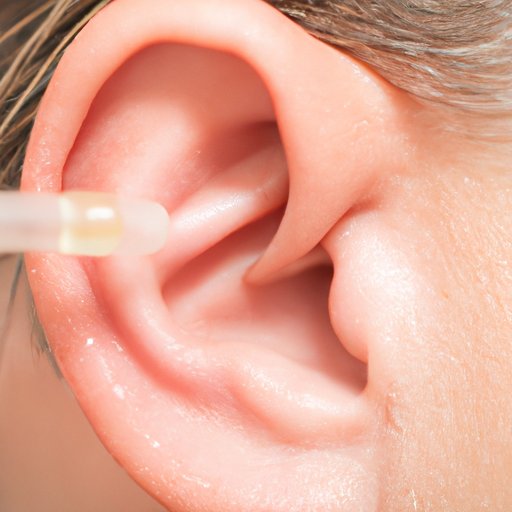
Introduction
Earwax buildup is a common problem that affects people of all ages. It can cause discomfort, difficulty hearing, and even infection if left untreated. Properly cleaning your ears can help prevent these issues. And one effective solution is hydrogen peroxide. Hydrogen peroxide is a safe and effective way to remove earwax. This article will provide a step-by-step guide on how to safely clean your ears with hydrogen peroxide.
Step-by-Step Guide
To clean your ears with hydrogen peroxide, you will need:
- Hydrogen peroxide solution of 3% or less
- A dropper or syringe to hold the solution
- Warm water
- A bulb syringe or cotton balls
To start, follow these steps:
- Mix equal parts of hydrogen peroxide and warm water in a clean container.
- Fill the dropper or syringe with the solution.
- Lay on your side, with the ear you want to clean facing up.
- Slowly and gently drop three to four drops of the hydrogen peroxide solution into your ear.
- Keep your head tilted for about 5 minutes, allowing the solution to work its way into your ear.
- Use the bulb syringe or cotton balls to gently flush out your ear with warm water.
- Repeat with the other ear by following the same steps.
When using hydrogen peroxide, it is important to take your time and follow each step carefully. Do not put anything in your ear if you have a ruptured eardrum or ear infection history.
Safety Tips
Before using hydrogen peroxide to clean your ears, here are some safety tips to keep in mind:
- Use only 3% hydrogen peroxide solution or less.
- Do not use hydrogen peroxide if you have a ruptured eardrum.
- Do not use hydrogen peroxide if you have a history of ear infections.
- If you experience dizziness, pain, or discomfort, stop using the solution and consult a doctor.
- Do not use hydrogen peroxide too frequently (more than once a week) as it can irritate the skin in your ear canal
Benefits of Using Hydrogen Peroxide
Hydrogen peroxide has multiple benefits when used to clean your ears:
- It is an inexpensive and safe way to remove earwax buildup.
- It can help reduce the risk of ear infections caused by bacteria and fungus.
- It also has other applications, such as cleaning and disinfecting surfaces and wounds.
Importance of Ear Cleaning
Cleaning your ears regularly is essential to maintain good ear hygiene. However, it is important to note that excessive ear cleaning can lead to irritation, infection, and damage.
To determine if your ears need cleaning, look for signs of wax buildup such as difficulty hearing, ear pain, or ringing in the ears. If you experience these symptoms, consult your doctor before attempting to clean your ears.
Hydrogen peroxide is a good option for ear cleaning, as it is effective in removing wax buildup and bacteria without damaging the ear canal. You should, however, use other safe and effective methods, such as a warm cloth or earplugs, to maintain good ear hygiene.
Alternative Methods
There are various other methods to clean your ears besides using hydrogen peroxide. You can use a warm cloth or earplugs to soften the earwax, allowing it to drain out of your ear. Another option is to use an over-the-counter earwax removal kit. These kits contain drops that dissolve the earwax or tools that help remove it.
While using hydrogen peroxide for ear cleaning has its benefits, it is important to note that it may not be suitable for everyone. For example, people with sensitive skin may experience irritation, and people with perforated eardrums should not use hydrogen peroxide.
Conclusion
Cleaning your ears on a regular basis is vital to maintaining good ear health. Hydrogen peroxide is a safe and effective method to remove earwax buildup and decrease the risk of infection. To use hydrogen peroxide safely, follow the step-by-step guide provided, and follow proper safety measures.
Remember to consult your doctor before attempting to clean your ears if you have a history of ear infections or problems with your ears. Also, consider alternate methods of ear cleaning if you do not feel comfortable using hydrogen peroxide regularly.




